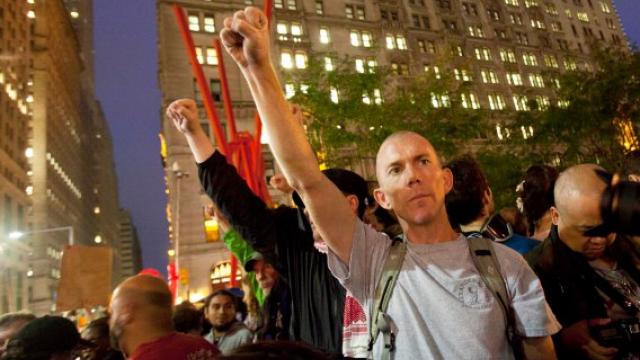
The de Blasio administration has been ordered to pay $260,000 to a teacher whose 2012 firing was overturned in State Supreme Court. David Suker, who was terminated for a series of disciplinary charges that he said stemmed from his role as an activist in the Occupy Wall Street protests, was awarded three years of back pay.
Though a Supreme Court Justice had tossed out the most-serious charge of lying about his daughter’s residence to enroll her in two prestigious Manhattan schools, an arbitrator’s Dec. 22 ruling fined him $7,000 for breaking several Department of Education rules.
Reasons for Discipline
Mr. Suker, who in 2011 was a tenured Teacher at GED Plus at Bronx Regional Referral Center for students up to 21 years old, was one of hundreds of protesters who stormed the Brooklyn Bridge during Occupy Wall Street demonstrations. The Army veteran and 12-year teacher was disciplined after not reporting a protest-related arrest within a 24-hour window, excessive absences, confrontations with colleagues and inciting students against police during an October 2011 town-hall meeting at Bronx Regional High School.
During a disciplinary hearing, he said he spent a day in jail and was unable to contact administrators, and claimed he believed family- and medical-related absences had been approved by his principal. But the hearing officer at the time recommended that Mr. Suker should be fired for giving a false address in 2001 and 2006 so his daughter could gain admission to P.S. 87 and the Columbia Secondary School for Math, Science and Engineering.
The following year, Manhattan State Supreme Court Justice Alice Schlesinger vacated the termination on appeal, saying that the falsification charge was outside the three-year statute-of-limitations for non-criminal offenses. (Though his daughter lived in The Bronx, investigators initially believed she lived outside the city.)
"Don’t Warrant Firing"
The remaining charges “even in the aggregate, do not constitute warranting termination,” she wrote. In June 2015, the Appellate Division First Department upheld her decision, sending the issue back to the DOE to decide the smaller penalty.
In last month’s decision, arbitrator Susan Sangillo Bellifemine said that the charges “clearly demonstrate that he was excessively absent, he violated a Chancellor’s regulation, he exhibited unprofessional and disruptive conduct, he flouted procedures, and he failed to treat his co-worker and students with the respect expected in a professional environment.” But, she wrote, a fine “will be sufficient to assure that respondent will appreciate the seriousness of the charges and the need to avoid this type of conduct in the future.”
Mr. Suker said he was happy but frustrated after enduring three years of unemployment with a newborn son, and seeing his daughter interrogated several times by DOE officials about where she lived. He said he offered to settle for much more than he was ultimately penalized. “To be vindicated the way I am with just the $7,000 fine, I’m elated,” he said.
He was reinstated in September and has since been working outside the classroom. A DOE spokesman said Mr. Suker has been assigned to administrative duties.
A Costly Crusade
His attorney, Maria Chickedantz with the firm Eisner and Associates, estimated that the city spent at least $1 million on the charges, based upon the average cost of disciplinary hearings, legal fees, an Office of Special Investigations inquiry and on substitute Teachers.
She speculated that the DOE continued to appeal the case because of a precedent established by Justice Schlesinger’s ruling: if it wants to prosecute incidents at least three years older than the charges, it has to prove they were criminal violations. An educator would previously have waived the statute-of-limitations defense if those prior incidents weren’t raised during the disciplinary hearing.
“This case means that a teacher doesn’t have to do that anymore,” Ms. Chickedantz said. “There was a lot of money that was spent on this particular case, because I think the risk of allowing [Justice Schlesinger’s] decision to stand is very good for Teachers and bad for the DOE.”
Mr. Suker, who was critical of United Federation of Teachers attorneys originally assigned to his case, is running in an upcoming union election for one of seven high-school executive-board seats on a dissident slate, UFT Solidarity, headed by Francesco Portelos.
3 WAYS TO SHOW YOUR SUPPORT
- Log in to post comments













